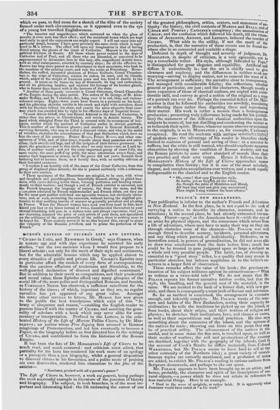MOON'S EDITION OF CICERO'S LIFE AND LETTERS.
"CICERO in Latin, and XENOPHON in Greek," says GIBBON, when in mature age and with ripe experience he narrated his early studies, "are the two ancients whom I would first propose to a liberal scholar; not only for the merit of their style and sentiments, but for the admirable lessons which may be applied almost to every situation of public and private life. CICERO'S Epistles may in particular afford the models of every form of correspondence, from the careless effusions of tenderness and friendship, to the well-guarded declaration of discreet and dignified resentment." But in addition to their merit as compositions, and their prudential and moral value, these Epistles afford very many glimpses of the social life of the more polite and distinguished Romans, and furnish, as Coss:mats NEPOS has observed, a sufficient substitute for the history of the times ; of which, important as they are, no regular narrative has yet appeared of any great value. Amongst his many other services to letters, Mr. MOXON has now given to the public the best translations which exist of this "li- brary of eloquence and reason,"—enabling the English reader to possess himself with the matter of CICERO, and assisting the gene- rality of scholars with a book which may serve alike for com- mentary or interpretation. Prefixed to the Letters, is the cele- brated Historg of Me .Life of Marcus Tullius Cicero, by Dr. MID- IMETON ; an author whose Free Inquiry first aroused in GIBBON misgivings of Protestantism, and led him eventually to become a Papist, as the biography before us first directed hint to the writings of CICERO, and contributed to form the historian of the Roman Empire.
It has been the fate of Dr. MIDDLETON'S Life of Cicero to be much read, and much censured : and criticism must admit, that partiality for his hero has rendered his work more of an apology or a panegyric than a just biography, whilst a general disposition to discover virtues in his favourites, and a polite mode of' praising nis own discoveries, rendered him obnoxious to the jibe of the satirist- " Narcissus, praised with all a parson's power."
The Life of Cicero is, however, a work sui generis, being perhaps the most successful example in literature of the junction of history and biography. The subject, in both branches, is of the most im- portant and interesting kind: the life embracing the career of one of the greatest philosophers, critics, orators, and statesmen of as. tiquity: the history, the civil contests of Mainuis and Syra.s, amid CZESAR and POMPEY ; CATILINE'S conspiracy; the assassination of C/ESAR; and the confusion which followed his death, till the trim. virate of AUGUSTUS, ANTONY, and LEPIDUS, induced the murder of CICERO. What adds to the utility, if not the merit of the production, is, that the narrative of these events can be found no- where else in so connected and readable a shape.
Deficient in depth of thought and severity of judgment, Ds MIDDLETON, in despite of criticism, is a very agreeable, not to say a remarkable 'writer. His style, although ridiculed by Pope,* is distinguished for great elegance and equability. Artificial and diffuse it undoubtedly is; but the art is chiefly used to give clearness and euphony, and the diffuseness is neither weak not wearying—serving to display matter, not to conceal the want of it. The arrangement is sufficient ; the narrative clear to transparency, and managed with considerable felicity; the reflections, whether general or particular, are just ; and the characters, though mostly a mere expansion of those of classical authors, are copied with consi. derable skill, and convey as good a notion of the original as a copy of a portrait can ever do. Perhaps the essential defect of Dr, MIN DLETON is that he followed his authorities too servilely, translating or reflecting them rather than digesting them and reproducing their matter. His work is rather a mosaic than a homogeneous production ; presenting truly (allowance being made for his partiali- ties) the statement of the different classical authorities upon the subjects he treats of, but not distilling and condensing the matter so as to furnish their spirit. Hence, whatever seems obscure or unjointed in the originals, is so in MIDDLETON ; as, for example, CATimax's conspiracy. He read the ancients with antique spectacles .•.rzte,•.1 of modern eyes; the advantage of his reader is therefore chiefly limited to easiness of perusal and saving of time : as a narrator he suffices, but the critic is still wanted, who should explicate apparent obscurities by showing the condition of Roman society, and test the Roman patriots by some other standard of morals than their own practice and their own vaunts. • Hence it follows, that Dr. MIDDLETON'S History of the Life of Cicero approaches nearer to compilation than history ; but it is one of the most scholarly, elegant, and complete compilations ever written, and a work equally indispensable to the classical and to the English reader.
" Oh, come! that easy Ciceronian style,
So Latin, yet so English all the while, As, though the pride of Middleton and Bland, All boys may read and girls may understand! Then might I sing without the least offence."


























 Previous page
Previous page